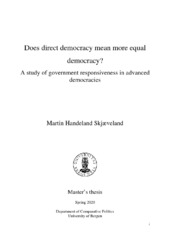| dc.description.abstract | As it constitutes a main feature of contemporary democracy, government responsiveness has provided the basis for large a body of literature, usually finding that public policy tends to reflect the preferences of citizens. However, more recent research has found representational bias in that policies tend to be considerably more responsive to the preferences of the rich than to those of the poor, meaning that the democratic principle of political equality is violated. This has highlighted the need to further examine what the factors and causal mechanisms behind such differential responsiveness are. Since they decide how political preferences are translated into policy, institutional structures are expected to affect the extent to which public preferences are represented and to whose preferences policies are responsive to. Direct democratic institutions have raised attention in this respect because they may incentivise citizens to engage more in politics and the possibility of popular referendums may force representatives to consider potential vetoes from the population. On the other hand, direct democracy may also enhance representational inequalities because the rich are better positioned to take advantage of such institutions. To investigate whether direct democracy affects representational inequalities based on income, I construct an original dataset where I link ISSP survey data with corresponding public spending data. The dataset covers 26 advanced democracies over 5 time points in the period 1985-2016 and is analysed using time-series cross-sectional methods. In line with previous research, I find that governments tend to be responsive to the preferences of citizens, but that this responsiveness is tilted towards the preferences of the rich. Furthermore, I find that direct democracy has no significant impact on general responsiveness or inequality in terms of representation. | en_US |
